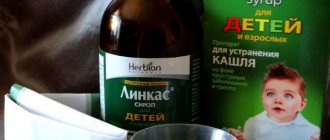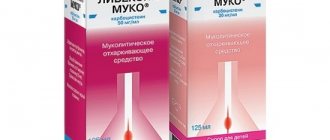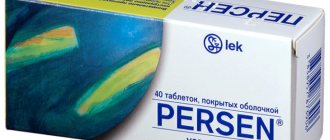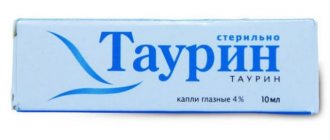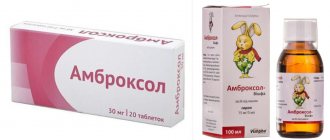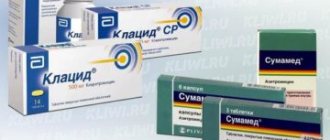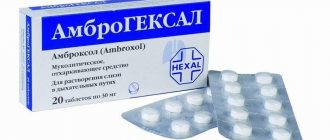Analogues of the drug according to ATC codes:
AMBROBENE AMBROGEXAL AMBROXOL VRAMED AMBROXOL-CHEMOPHARM AMBROSAN LAZOLVAN LAZOLVAN LAZONGIN MEDOX SUPRIMA-KOF FLAVAMED CHALIXOL All
Release form, composition and packaging
Tablets are white, round, flat-cylindrical in shape with a chamfer.
| 1 tab. | |
| ambroxol hydrochloride | 30 mg |
Excipients: corn starch, lactose, magnesium stearate, talc.
10 pieces. — contour cell packaging (2) — cardboard packs. 10 pcs. — contour cell packaging (3) — cardboard packs. 10 pcs. — contour cell packaging (5) — cardboard packs. 10 pcs. — contour cell packaging (10) — cardboard packs.
Syrup in the form of a clear liquid from colorless to slightly yellowish.
| 5 ml | |
| ambroxol hydrochloride | 15 mg |
Excipients: liquid sorbitol, methyl parahydroxybenzoate (nipagin or methylparaben), propyl parahydroxybenzoate (nipazole), propylene glycol, sodium saccharinate, liquid food flavoring, purified water (up to 1 ml).
100 ml - dark glass bottles (1) - cardboard packs. 100 ml - dark glass bottles (1) complete with a dosing spoon or cup - cardboard packs.
Reviews
To complete the picture, here are reviews from parents about Bronchorus syrup for children.
- Veronica N.: “I usually bought medicinal syrup for 200 rubles and more, until a friend, who, like me, has children, suggested that I buy Bronchorus for “ridiculous” money, as they say today. The result is wonderful."
- Olga M.: “It is important for me that Bronchorus does not contain sugar, since my daughter has diabetes. Twice a day, 2.5 ml of syrup is the norm that is enough for the girl to get better. But without a pediatrician’s prescription, I would not recommend taking the medicine - there is a risk of allergies.”
- Rimma Ch.: “The first time we were seriously ill. At first they tried to overcome my son’s cough with the help of Ambrobene, at the final stage the doctor prescribed Bronchorus. It is difficult to say which drug is more effective. Both probably helped.”
- Irina K.: “I’m very afraid of a child’s cough, lest it drag on and lead to complications. In the early stages, I give my son Bronchorus (a couple of times during the day). Helps very quickly."
- Diana Sh.: “I read in the instructions that you can give Bronchorus to children almost from birth. The pediatrician also did not object. The only thing I was afraid of was whether my daughter would take this medicine, but she even liked it.”
Giving medicine to a child, especially the smallest one with whom you “cannot agree,” is very difficult. The manufacturers of Bronchorus took this point into account by producing a drug that does not cause rejection in children. Drinking on time in the prescribed dosage, the healing syrup relieves cough and promotes the baby’s rapid recovery.
pharmachologic effect
Mucolytic and expectorant drug. It has secretomotor, secretolytic and expectorant effects.
Ambroxol stimulates the motor activity of the cilia of the ciliated epithelium of the bronchial mucosa (mucokinetic or secretomotor effect).
Peristaltic contractions in a spiral of ciliated (ciliary) cells of the bronchial epithelium remove mucus from the bronchial tree (mucociliary transport or mucociliary clearance). Ambroxol significantly improves mucociliary transport.
Ambroxol stimulates the serous cells of the glands of the bronchial mucosa, increases the content of the mucous component of sputum and normalizes the disturbed ratio of the serous and mucous components of sputum. By activating hydrolyzing enzymes and enhancing the release of lysosomes from Clara cells, it reduces the viscosity of sputum and its adhesive properties (mucolytic or secretolytic effect).
Ambroxol increases the synthesis and secretion of a surfactant (surfactant) in the alveoli and bronchi.
As a result of these mechanisms, the viscosity of sputum is significantly reduced and expectoration is improved.
When taken orally, the effect of the drug occurs within 30 minutes and lasts for 6-12 hours.
Bronchorus tablets and syrup
Bronchorus is a representative of the pharmacological group of expectorants, mucolytics.
The drug is intended for oral administration and is presented as a colorless syrup of liquid consistency. It can be an independent medicine, but it is also appropriate to use it as part of complex therapy for bronchitis, pneumonia and other respiratory tract pathologies.
On this page you will find all the information about Bronchorus: complete instructions for use for this drug, average prices in pharmacies, complete and incomplete analogues of the drug, as well as reviews from people who have already used Bronchorus. Would you like to leave your opinion? Please write in the comments.
Prices
How much does Bronchorus cost? The average price in pharmacies is 70 rubles.
Release form and composition
1 ml of syrup contains:
- active ingredient: ambroxol hydrochloride – 3 mg;
- auxiliary components: sorbitol, propyl parahydroxybenzoate, raspberry flavor, methyl parahydroxybenzoate, sodium saccharinate dihydrate, propylene glycol, purified water.
1 tablet contains:
- active ingredient: ambroxol hydrochloride – 30 mg;
- auxiliary components: magnesium stearate, corn starch, lactose, talc.
Pharmacological effect
Ambroxol has secretolytic, secretomotor and expectorant effects.
By stimulating and increasing the motor activity of the cilia of the ciliated epithelium of the bronchial mucosa (mucokinetic or secretomotor effect), the drug prevents their adhesion.
Peristaltic contractions of the ciliated (ciliary) cells of the bronchial epithelium, carried out in a spiral, lead to the removal of mucus from the bronchial tree, thereby significantly enhancing mucociliary transport.
By activating the serous cells of the glands of the bronchial mucosa, ambroxol promotes an increase in the mucous component of sputum, normalizing the balance of the mucous and serous components. The drug causes activation of hydrolyzing enzymes and promotes increased release of lysosomes from Clara cells, which causes a decrease in the viscosity of sputum and its adhesive properties.
Indications for use
In what cases should you take Bronchorus (tablets)? Instructions for use recommend using the product to treat cough, which is accompanied by the formation of viscous and difficult to separate mucus.
The medication is prescribed for the following pathologies:
- asthma with difficult sputum discharge;
- bronchiectasis;
- obstructive chronic pulmonary disease;
- bronchitis in chronic or acute form;
- respiratory distress syndrome in children (newborns).
Doctors prescribe the stated medicine when wheezing is detected in the respiratory tract. A person is not able to install them on his own. Therefore, the manufacturer advises that before using the drug, consult a specialist and undergo an examination.
Instructions for use
The instructions for use indicate that if Bronchorus syrup is prescribed for children, the instructions for use clearly specify the daily doses. However, it doesn’t hurt to additionally consult with your doctor, especially when it comes to the health of a sick child.
Below are medical prescriptions according to the age category of patients:
- Children under 2 years of age can be given half a teaspoon twice a day in between meals.
- Children under 5 years of age are advised to take half a teaspoon three times a day, maintaining the same time interval.
- For children under 12 years of age, a single dose is 1 teaspoon in three daily doses.
- Older patients need to take a tablespoon of medication three times a day.
- Adult patients are strongly recommended to choose the medicine Bronchrus in tablet form.
Separately, it is worth clarifying that adult patients in the fight against phlegm are recommended to choose tablets that have a strong effect and are in no way inferior to syrup in terms of pharmacological properties. If parents have any doubts, it is better to seek additional advice to rule out a threat to children’s health.
The medication must be taken in its entirety. The duration of such therapy is 5-7 days, depending on the clinical picture. If there are no changes, already on the fifth day you can replace Bronchorus syrup with an analogue. Such corrections are introduced into the treatment regimen by the local doctor, taking into account drug interactions.
Analogs
The medical drug Bronchorus has a gentle effect; moreover, the chemical composition does not contain glucose. Therefore, the medicine can be safely prescribed to children, while carefully monitoring changes in general well-being. If there is no therapeutic effect after 5-7 days, you can choose an analogue.
The following medications have proven themselves to be effective:
- Ambroxol;
- Ambrobene;
- Lazolvan;
- Codelac Broncho;
- Erespal.
Before using analogues, consult your doctor.
Storage conditions and shelf life
Bronchorus syrup should be stored in a dry place, protected from moisture and light, at a temperature of 15 to 25°C. The shelf life from the date of manufacture is 3 years.
Keep away from children. The drug can be purchased at retail pharmacies without a special prescription, but before starting therapy you should carefully read the official instructions.
Source: https://simptomy-lechenie.net/bronxorus/
Pharmacokinetics
Suction
Absorption - high, Tmax - 2 hours.
Distribution
Plasma protein binding - 80%. Penetrates through the blood-brain barrier, placental barrier, and is excreted in breast milk.
Metabolism
Metabolized in the liver to form dibromoantranilic acid and glucuronic conjugates.
Removal
T1/2 - 7-12 hours. Excreted by the kidneys: 90% in the form of water-soluble metabolites, unchanged - 5%.
Pharmacokinetics in special clinical situations
T1/2 increases with severe chronic renal failure, does not change with impaired liver function.
Side effects
After the first days of taking it, some people experience diarrhea, mild nausea and accompanying vomiting with excessive dry mouth. You feel weak, excessively tired and drowsy. Allergies may begin and the person will be thirsty almost constantly.
Overdose
An overdose is accompanied by all the symptoms of poisoning and requires artificial induction of vomiting, gastric lavage in the first two hours after symptoms are detected and consumption of fatty foods.
Drug interactions
It is not advisable to take with other anti-expectorant drugs, as this interaction may negatively affect the optimal output of sputum from the body, making a quick recovery difficult.
Additional instructions
The drug does not contain sugar, so it is often prescribed to people with diabetes. In this case, there is no risk of developing the disease, but the dose is adjusted and is more like a child's dose.
It is prohibited to drive on your own, as the syrup can cause fatigue, drowsiness and lead to a significant deterioration in attention.
BRONCHORUS: DOSAGE
The drug is taken orally, during meals, with a small amount of liquid.
Adults and children over 12 years of age are prescribed 30 mg (1 tablet or 10 ml of syrup) 3 times a day. If necessary, to enhance the therapeutic effect, you can prescribe 60 mg (2 tablets) 2 times a day.
In severe cases of the disease, the dose is not reduced throughout the entire course of treatment.
For children under 12 years of age, the drug is prescribed in syrup form.
Children aged 5-12 years are prescribed 15 mg (5 ml of syrup, i.e. one full teaspoon) 2-3 times a day, at the age of 2-5 years - 7.5 mg (2.5 ml of syrup, i.e. half teaspoon) 3 times a day, up to 2 years - 7.5 mg (2.5 ml syrup) 2 times a day.
The need to use the drug for more than 4-5 days is determined by the doctor individually.
Contraindications
Does the medication we are considering have any contraindications? Experts say that it is tolerated quite well by all patients, but it is not recommended to be prescribed in the following cases:
- in the first trimester of pregnancy;
- if the patient is hypersensitive to the main and additional ingredients of the drug.
It should also be noted that Bronchorus syrup contains sorbitol. Therefore, it should not be given to adults or young patients with hereditary fructose intolerance.
This drug is recommended to be used with caution in cases of liver failure, gastrointestinal ulcers, renal failure, during lactation, as well as in the last two trimesters of pregnancy.

